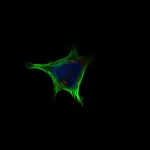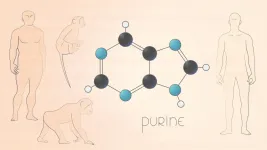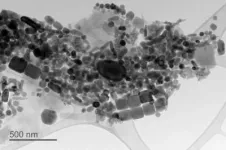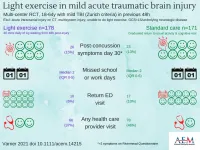Decolonising ecology? How to adopt practices that make science more equitable
2021-05-24
(Press-News.org) Knowledge systems outside of those sanctioned by Western universities have often been marginalised or simply not engaged with in many science disciplines, but there are multiple examples where Western scientists have claimed discoveries for knowledge that resident experts already knew and shared. This demonstrates not a lack of knowledge itself but rather that, for many scientists raised in Western society, little education concerning histories of systemic oppression has been by design. Western scientific knowledge has also been used to justify social and environmental control, including dispossessing colonised people of their land and ways of life and discounting existing knowledge systems.
But how can those in the ecological discipline slowly begin to practise ecology in a more creative, reflective, equitable and inclusive way? According to a new paper published in the journal Nature Ecology & Evolution there are five interventions to build a more anti-oppressive and decolonial ecology:
Decolonise your mind to include multiple ways of knowing and communicating science;
Know your histories to acknowledge the role research has played in enabling colonial and ongoing violence against peoples and nature, and begin processes of restorative justice;
Decolonise access by going beyond Open Access journals and data repositories to address issues of data sovereignty and the power dynamics of research ownership;
Decolonise expertise by amplifying diverse expertise in ecologies from local experts and giving due credit and weight to that knowledge; and
Practice ethical ecology in inclusive teams by establishing diverse and inclusive research teams that actively deconstruct biases so all team members are empowered participants in developing new knowledge.
"These actions are not offered as a checklist capable of undoing unjust systems worldwide, nor to overshadow long histories of place-based anti-colonial and anti-racist struggle, but as connection points to action for practising ecologists," said Dr Chris Trisos, from the Africa Climate and Development Initiative based at the University of Cape Town and co-author of the paper Decoloniality and anti-oppressive practices for a more ethical ecology.
"Because settler-colonial processes have increased vulnerability of people and other species by displacing them into unfamiliar or lower quality landscapes, the concept of ecological vulnerability to environmental change intersects with environmental justice," he added.
Co-author Dr Jess Auerbach from the Department of Anthropology at North-West University shared that access to scholarly literature and data resources is a global issue. Data and research papers are often locked behind a paywall or housed in servers and museums in the Global North even when the data collected was from the Global South. "This makes it inaccessible to scholars from under-resourced institutions who are often compelled to use pirate websites to read scientific publications. Publishing only open access resources is part of the solution but the issues run much deeper and consideration must be given to where data repositories are held, who holds the right to this data and what is needed to access it," she said.
One area the researchers highlight is the use of English as the dominant form of knowledge communication in science which can lead to publication bias against non-native English-speaking scientists. When one reads, writes and thinks in English, it is easy to forget that for the majority of people ecological knowledge is produced and tested in other tongues. It is ironic that in many ecology departments, knowing Latin names of species is met with admiration, whereas speaking living languages of sites of data origination is a 'nice to-have' skill.
Ecological scholarship must thus develop methods to include multiple languages in evidence synthesis and could require that scholars gain fluency in relevant languages as an essential entry point for understanding rich bodies of local knowledge on ecosystems and cultivating a more inclusive way of knowing and studying ecology. More inclusive teams are also needed to lead these projects and actively deconstruct biases. Diverse teams that include and amplify the voices of indigenous communities result in more innovative and effective problem solving and richer datasets.
Co-author Associate Professor Madhu Katti from North Carolina State University in the USA shared an example: "The Amazon Conservation Team works with Indigenous communities in several South American countries in participatory projects to promote self-governance and biodiversity conservation. They have developed a methodology of collaborative cultural mapping by providing technology such as mobile phones and apps to Indigenous communities. The Kogi people, among the last surviving civilizations from the pre-Columbian period started using a mobile phone app to create geo-referenced maps of their land within the framework of their own cultural knowledge, resulting in a richer dataset than a parachuting Western ecologist or conservationist might be able to gather.
"Analysis of change in social-ecological systems must consider the impacts of colonial histories and offer solutions in a decolonial framework. More opportunities for historically marginalized groups to set research agendas is an important way of redressing ongoing power imbalances," he added.
INFORMATION:
Access the paper: Decoloniality and anti-oppressive practices for a more ethical ecology
[Attachments] See images for this press release:
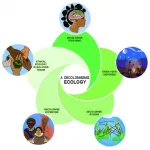
ELSE PRESS RELEASES FROM THIS DATE:
2021-05-24
Our brain is usually well protected from uncontrolled influx of molecules from the periphery thanks to the blood-brain barrier, a physical seal of cells lining the blood vessel walls. The hypothalamus, however, is a notable exception to this rule. Characterized by "leaky" blood vessels, this region, located at the base of the brain, is exposed to a variety of circulating bioactive molecules. This anatomical feature also determines its function as a rheostat involved in the coordination of energy sensing and feeding behavior.
Several hormones and nutrients are known to influence the feeding neurocircuit in the hypothalamus. Classic examples are leptin and insulin, both involved in informing the brain of available energy. In the last years, the ...
2021-05-24
Skoltech scientists and their colleagues from Germany and the United States have analyzed the metabolomes of humans, chimpanzees, and macaques in muscle, kidney, and three different brain regions. The team discovered that the modern human genome undergoes mutation which makes the adenylosuccinate lyase enzyme less stable, leading to a decrease in purine synthesis. This mutation did not occur in Neanderthals, so the scientists believe that it affected metabolism in brain tissues and thereby strongly contributed to modern humans evolving into a separate species. The research was published in the journal eLife.
The predecessors of modern humans split from their closest evolutionary relatives, Neanderthals and Denisovans, about 600,000 ...
2021-05-24
A new low-cost and sustainable technique would boost the possibilities for hospitals and clinics to deliver therapeutics with aerogels, a foam-like material now found in such high-tech applications as insulation for spacesuits and breathable plasters.
With the help of an ordinary kitchen freezer, this newest form of aerogel was made from all natural ingredients, including plant cellulose and algae, says Jowan Rostami, a researcher in fibre technology at KTH Royal Institute of Technology in Stockholm.
Rostami says that the aerogel's low density and favorable surface area make it ideal for a wide range of uses, ...
2021-05-24
CHAMPAIGN, Ill. -- Scientists report that it is possible to detect and predict heat damage in crops by measuring the fluorescent light signature of plant leaves experiencing heat stress. If collected via satellite, this fluorescent signal could support widespread monitoring of growth and crop yield under the heat stress of climate change, the researchers say.
Their study measures sun-induced chlorophyll fluorescence - or SIF - to monitor a plant's photosynthetic health and establish a connection between heat stress and crop yield. The findings are published in the journal Global Change Biology.
Sun-induced chlorophyll fluorescence occurs when a portion of photosynthetic energy, in the form of near-infrared light, is emitted from plant leaves, the researchers said.
"There ...
2021-05-24
Fifty-six million years ago, as the Earth's climate warmed by five to eight degrees C, new land mammals evolved, tropical forests expanded, giant insects and reptiles appeared and the chemistry of the ocean changed. Through it all, bacteria in the ocean in what is now New Jersey kept a record of the changes in their environment through forming tiny magnetic particles. Now, those particles and their record are all that's left of these microorganisms. Thanks to new research tools, that record is finally being read.
In research published in the journal Paleoceanography and Paleoclimatology, researchers including University of Utah doctoral student Courtney Wagner and associate professor Peter Lippert report the climate clues that can ...
2021-05-24
By making a game out of getting their daily steps, new research points to the possibility that people with diabetes could be nudged toward increasing their physical activity, with changes lasting for a full year. Since many now use apps or other digital means to manage their diabetes, this program - which utilized tools like wearable step counters and electronic scales with personalized goals - could potentially be integrated to help individuals achieve greater success. Findings from the study, conducted by a team from the Perelman School of Medicine ...
2021-05-24
Carbon is vital to the existence of all living organisms, since it forms the basis of all organic molecules that, in turn, form the basis of all living beings. While that alone is pretty impressive, it has recently found surprisingly novel applications in disciplines such as aerospace and civil engineering with the development of carbon fibers that are stronger, stiffer, and lighter than steel. Consequently, carbon fibers have taken over steel in high-performance products like aircrafts, racecars, and sports equipment.
Carbon fibers are usually combined with other materials to form ...
2021-05-24
Scientists studying a special kind of semimetals have found a material with an unusually pristine nature that could be crucial for developing powerful new quantum technologies and discovering new phases of matter.
In an open access paper published in Science Advances, Johns Hopkins physicists and colleagues at Rice University, the Vienna University of Technology (TU Wien), and the National Institute of Standards and Technology (NIST), present experimental evidence of naturally occurring quantum criticality in a material.
Criticality is the point at which a material hovers between two phases--like the slushy transition between water and ice--without ever settling. Useful materials often exploit this point. For example, air conditioners use compressors to change refrigerant ...
2021-05-24
In order to understand foodways and subsistence strategies of humans in the past, as well as distributions of ancient animal species, it is critical for archaeologists to accurately identify animal taxa in archaeological sites. Many sites across sub-Saharan Africa have fragmented and poorly preserved animal bones, leaving the majority of specimens unidentifiable. Sub-Saharan Africa is also home to the greatest diversity of bovids on Earth, including African buffalo, wildebeest, eland, and duikers, as well as domestic sheep, goat, and cattle. The sheer number of osteologically similar animals in Africa presents a major challenge for identifying animal bones.
During the past decade, archaeologists have increasingly used a bone ...
2021-05-24
Des Plaines, IL - For acute mild traumatic brain injury (mTBI), there were no differences in recovery or health care utilization outcomes with prescribed early light exercise compared to standard care. These are the results of a study titled A randomized trial comparing prescribed light exercise to standard management for emergency department patients with acute mild traumatic brain injury, to be published in the May issue of Academic Emergency Medicine (AEM) journal, a peer-reviewed journal of the Society for Academic Emergency Medicine (SAEM).
Findings of the study suggest that early light exercise may be encouraged as tolerated at emergency department discharge following mTBI, but this guidance is not sufficient ...
LAST 30 PRESS RELEASES:
[Press-News.org] Decolonising ecology? How to adopt practices that make science more equitable

